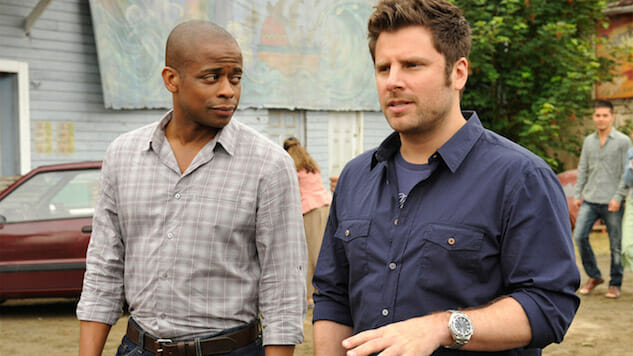Mr. Robot‘s Emmy Success and the End of USA’s “Blue Sky” Era
USA
It was a rather striking moment when Rami Malek won Outstanding Lead Actor in a Drama Series at this year’s Emmys—not because Malek isn’t great in his role as Elliot Alderson on USA’s Mr. Robot, but because the moment involved the words “USA’s Mr. Robot.” Part of the surprise stems from the Emmys rewarding a weird, idiosyncratic show like Mr. Robot. Here’s a show about a mentally ill young hacker on a quest to overthrow the powers that be. Sure, Christian Slater is on the show, but it’s not the ’90s anymore. It would have been thoroughly unsurprising if Emmy voters had found the show too outré for their more traditional tastes. But for the deranged among us who spend time thinking about the evolution of the TV landscape, the fact that a show from the USA Network won a major Emmy award was just as shocking as a show like Mr. Robot winning. More than that, the very idea of a show like Mr Robot airing on USA still feels a little strange to those of us who remember, and mourn, the network’s “blue sky” era.
Before Malek’s Emmy win, the most impactful cultural moment involving a USA program was probably the Saturday Night Live sketch “What is Burn Notice?” The joke of the sketch, and like many Saturday Night Live sketches there was really only one joke, was that people had a vague understanding that Burn Notice was a thing that existed, but couldn’t quite place what it was. This was a step up from where the network was in the ’90s, when it was home to series such as Pacific Blue and a TV version of Weird Science, but USA still lacked cultural cachet. What it didn’t lack was a fan base that was drawn to its specific brand of programming.
If you wanted light drama, or the occasional hour-long comedy, USA was the place for you. This was part of the “blue sky” ethos that permeated its original programs. Another part of it was pretty literal. USA’s shows were bright and sunny. They took place in lush, lovely locales. They were designed to be fun and to transport viewers. Yes, a few of the network’s shows were procedurals that involved murders, but even those never really got dark. There were plenty of places to get dark dramas, and dark comedies, on television. USA was the network that tried to make true the titular claim of a-ha’s “The Sun Always Shines on TV.”
The network first dipped its toe into these waters with Monk—a crime procedural with a twist that made it the ostensible Patient Zero for the “blue sky” era. Tony Shalhoub played a persnickety, obsessive-compulsive detective named Adrian Monk. As he went about the business of solving crimes, his phobias and hang-ups got him into situations that cut through the tension. The series was lighter than most of its procedural competitors, such as CSI and Criminal Minds. (Shalhoub received eight Emmy nominations for Monk, including three wins, in the less “prestigious” comedy category.)
The “blue sky” era really kicked it into high gear in 2007, when the aforementioned Burn Notice debuted. Jeffrey Donovan starred as Michael Westen, a former spy who put together something of a modern A-Team in Miami, Florida. There were jokes and big explosions and, yes, a lot of sunshine. Along with the likes of White Collar—in which a con man (Matt Bomer) helps an FBI agent (Tim DeKay) bring down white-collar criminals—Covert Affairs—with Piper Perabo as a CIA agent—and Royal Pains—about a doctor for rich people in the Hamptons—Burn Notice exemplified the breezy “blue sky” style, but none of the network’s offerings quite matched Psych, the crown jewel in USA’s azure tiara.
-

-

-

-

-

-

-

-

-

-

-

-

-

-

-

-

-

-

-

-

-

-

-

-

-

-

-

-

-

-

-

-

-

-

-

-

-

-

-

-








































